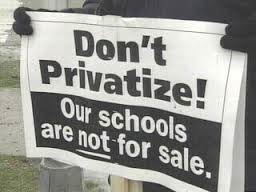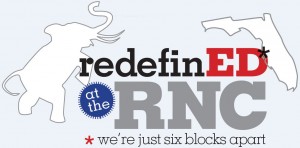Breaking news from POLITICO tonight:
TALLAHASSEE — Florida’s statewide teachers’ union is losing an ally in its quest to eradicate a voucher-like scholarship program thati lets poor kids attend private schools.
The Florida PTA is dropping out of the Florida Education Association’s lawsuit over the 15-year-old program, in which corporations save on their tax bills by funding the scholarships.
The PTA joined the FEA, as well as the state’s chapter of the NAACP and others, in challenging the constitutionality of the policy. But, under a new president and board of directors, the advocacy group representing parents and teachers has decided not to participate going forward.
Full story here.
Two events of national import on the school choice front in Florida deserve more celebration. Both of them – the 10,000-strong school choice rally with Martin Luther King III, and the signing of the bill expanding Florida’s education savings account program – suggest the choice debate continues to move to a less political place, or at least a more bipartisan one. Who doesn’t say hooray to that?

If expanding educational options for students with special needs is worthy of a collective cheer, is there good reason not to do the same for students disadvantaged by poverty? (Photo courtesy of Silver Media)
The Jan. 19 rally generated a flood of headlines in large part because of King. Many in the school choice realm know choice has roots on the left, but that’s not common knowledge among choice critics or reporters. So when the son of Dr. King joined thousands of low-income parents chanting “Drop The Suit!” (referring to the lawsuit the teachers union filed to kill the state’s tax credit scholarship program), fresh ink flowed by the barrel over stale narratives about right-wing plots.
The choice rally was also upbeat and nearly apolitical, unlike a teacher union rally the week prior. The choice crowd sang “We Are Family”; the union rally played “We’re Not Gonna Take It.” Nobody at the former talked about kicking politicians out of office. King expressed faith in the courts: “Ultimately, if the courts have to decide, the courts will be on the side of justice,” he told the crowd. “Because this is about justice. This is about righteousness. This is about truth. This is about freedom – the freedom to choose what's best for your family, and your child most importantly.”
The bill signing two days later didn’t get as much publicity, but it was just as meaningful. Gov. Rick Scott okayed expansion of the Gardiner Scholarship after the bill sailed through the Legislature with overwhelming, bipartisan support. Formerly called the Personal Learning Scholarship Account, the Gardiner Scholarship for students with special needs is now the nation’s biggest education savings account program. It’s a sign of where things are headed as school choice becomes educational choice, and as the forces for customizing education rise to the fore.
It’s also a sign of political progress. For those familiar with Florida’s long-running “voucher wars,” seeing Democrats and Republicans alike go all in for the scholarship was incredible. The union savaged the PLSA before it became law in 2014, and even tried to kill the bill that created it. Less than two years later, every Democratic lawmaker is on board?! The support is even more stunning given how partisan school choice remains in virtually every state. What quietly happened in Florida with the Gardiner Scholarship is a sign of how things can and should be everywhere, and, slowly but surely, will be. (more…)
This post first appeared on the Friedman Foundation blog.
Social movements such as women’s suffrage, black civil rights, and parental choice in education involve the redistribution of social, political, and economic power. Because few groups in control of that power at the time are enlightened enough to share it voluntarily, these power struggles are usually contentious—but they don’t have to be.
Although school choice opponents have used name-calling, character assassination, and misinformation as key strategies in maintaining their power, thankfully they have refrained from the physical violence that often accompanies disruptive social change. The bad news is their strategies still undermine our civic discourse and make it more difficult to provide every child with an equal opportunity to succeed. Our children and our democracy deserve better.
Despite the opposition’s tact, school choice supporters should try engaging opponents, particularly teachers’ unions. I know that is easier said than done, but, in the long run, the willingness to search for common ground could accelerate the transition to greater school choice. I say this as someone who’s had a front-row seat on both sides of this debate.
I became a teachers’ union organizer in 1978, and, for the next 16 years, held a variety of local, state, and national leadership positions in both the American Federation of Teachers (AFT) and the National Education Association (NEA). Today, I am president of a nonprofit organization that helps administer our nation’s largest private school choice program.
Although neither side is without sin, I have been most disappointed by the discourse coming from the teachers’ unions and their anti-choice allies. When I talk with local, state, and national union leaders, I am stunned at how uninformed they are and how many falsehoods they have embraced as truths.
I recently had dinner with one of our country’s top teachers’ union leaders who told me there has never been research showing students benefit from school choice programs. And last month, I was on a panel with a top Miami-Dade union leader who erroneously said Florida’s tax credit students are not tested.
This level of ignorance is a reflection of how insular, polarized, and tribal our politics have become. People are increasingly retreating into self-contained echo chambers where they hear only the messages that reflect the positions of their political tribe. Without access to contrary views from sources they know and trust, people have no basis upon which to question the one-sided communications they are receiving. And few organizations are as insular and tribal as teachers’ unions.
Such insularity causes many union leaders to develop a mindset that says their positions are good and all contrary positions, and those who hold them, are evil—hence all the rhetoric coming from teachers’ union leaders.
There are also financial incentives at play. (more…)
Editor's note: This post was originally published as an op-ed in today's Orlando Sentinel. The state's tax credit scholarship program is administered by Step Up For Students, which co-hosts this blog.
 The politics of school choice are particularly unforgiving these days, but one of the messages being sold in this year's Florida legislative session is amusingly hypocritical.
The politics of school choice are particularly unforgiving these days, but one of the messages being sold in this year's Florida legislative session is amusingly hypocritical.
The backdrop is a bill to strengthen a scholarship that for the past 12 years has provided some economically disadvantaged Florida children access to private schools. Though the effort has been cast by opponents as a dramatic expansion, the bill headed for a House floor vote on Friday has been changed so it no longer contains either an increase in the statewide cap or a sales-tax credit — two of the most contentious parts. It's worth remembering that this scholarship is the only choice program with a statewide cap.
In politics, though, the size of the debate doesn't always conform to the size of the legislation. The Florida Education Association has launched an aggressive campaign to block it, including a requisite attempt to discredit the supporters. But what is especially entertaining is the FEA's feigned shock that scholarship advocates might invest in political campaigns involving Democrats.
The FEA is distributing a video from a 2011 school-choice conference in Berkeley, Calif., that features Doug Tuthill, who is president of the nonprofit that administers the tax-credit program and a former chapter president for FEA. The conference was put together by a group that includes many liberal academicians who appreciate the historical role teachers unions have played in providing financial support for Democrats. But they asked him how to break that grip because they are dismayed the money now comes with a prohibition on voting for private school choice.
Tuthill's answer was honest and direct: Invest in legislative races, just like the union does.
This is an unsurprising statement to anyone with even a passing acquaintance with modern politics, but FEA Vice President Joanne McCall was aghast: "This video reveals that it's all about the money."
Now I do not defend the way big money is impacting modern politics or the coarse campaigns that are often a byproduct, but to be lectured on the evils of campaign spending by the FEA is surreal. It is the FEA's primary political weapon. Since 2002, the FEA and its national affiliates have invested $20.1 million in Florida campaigns, according to the Florida Division of Elections. Its money is so integral to Florida Democratic legislators that no one raises an eyebrow when all the party's House and Senate members meet, as they did on April 2, at FEA headquarters. The low-income parents for whom the school-choice movement fights don't have money for campaigns. I am honored to fight for them and to help their voices be heard. (more…)

Everyone in the debate over how best to improve public education has private interests. Our collective challenge is to manage these often conflicting interests in ways that best serve the common good.
We all have private interests.
People pursuing their private interests – individually or as a group – is what drives progress and innovation. But our private interests should never trump the common good.
Private interests usurping the public good is privatization. Privatization is bad. It undermines democracy and progress.
Encouraging the pursuit of private interests while avoiding privatization is a core challenge for our economic and political democracy. In pursuing their private interests, individuals and organizations often claim their interests promote the common good, while the interests of those they disagree with don’t. Politics derives, in part, from conflicting claims of whose private interests better align with the common good.
We see this regularly in our debates over how best to improve public education.
As a long-time teacher union leader, I sold financial services, insurance and advocacy services to teachers working for school districts. Therefore, maximizing the number of teachers employed by school districts served my business interests. Our union continuously asserted that more teachers working for school districts served the common good, as did higher teacher salaries and benefits. Our favorite marketing slogan was, “Teachers’ working conditions are students’ learning conditions.”
Our union’s political and marketing strategy was to tie the private interests of district teachers to a greater common good (i.e., the welfare of children). Of course, the private interests of teachers are often – but not always – tied to children’s interest, so this was, and still is, an effective strategy.
Teacher unions use a similar political strategy when attacking school choice programs that empower students and teachers to attend schools not covered by union contracts. The unions accuse these schools of furthering privatization. As the National Education Association recently stated about charter schools not under union contracts: “We oppose the creation of charter schools for the purpose of privatization.”
Teacher unions are often criticized – unfairly in my opinion – for advocating for the private interests of district teachers. (more…)
My holiday wish is for teacher unions to expand their business model to include all public education teachers, and not just those employed by school districts.
 The industrial model of unionism that teachers borrowed from the auto and steel workers 50 years ago assumes a large number of employees working in a centralized, command-and-control management system. Unions lose money when they apply this industrial unionism to smaller, decentralized employers such as charter and private schools. Consequently, they protect their desired market by opposing all school choice programs that enable students to attend schools not owned and managed by school districts.
The industrial model of unionism that teachers borrowed from the auto and steel workers 50 years ago assumes a large number of employees working in a centralized, command-and-control management system. Unions lose money when they apply this industrial unionism to smaller, decentralized employers such as charter and private schools. Consequently, they protect their desired market by opposing all school choice programs that enable students to attend schools not owned and managed by school districts.
But they are losing this fight. Parents like school choice. More than 40 percent of Florida students – 1.3 million - are now attending a choice school, and their numbers are increasing daily. As teachers move with their students and membership losses accelerate, teacher unions will eventually be forced to expand their business model to include services for teachers working for smaller, non-district employers. This expansion might include providing charter, virtual and private school teachers with liability insurance, financial planning, professional development, political advocacy and employee leasing for teachers willing to pay unions for guaranteed employment.
Teacher unions are an important vehicle through which teachers can make their voices heard and impact political decision making, but they have historically been conservative and resistant to change. The National Education Association, the nation’s largest teacher organization, resisted collective bargaining for several years and only relented after losing thousands of members to the AFL-CIO affiliated American Federation of Teachers. Both the NEA and AFT will refuse to embrace a more progressive, inclusive unionism until their membership losses are so severe they have no other choice.
This day is coming. When it arrives, teachers, unions, students and the public will all benefit.
Coming Friday: Two posts. Wishing school choice parents were impossible to ignore. And wishing for more information to help parents make the best choice.
Randi Weingarten must be watching the RNC goings-on pretty closely too. Minutes ago, the president of the American Federation of Teachers sent out a lengthy press release criticizing "Won't Back Down," the new movie about a mother and a teacher who use a parent trigger type law to turn around a struggling, inner-city school.
I mention the timing because StudentsFirst is sponsoring a special screening of the movie at the RNC this afternoon, followed by a panel discussion with Jeb Bush, Condoleezza Rice, Michelle Rhee and the movie's director, Daniel Barnz.
In her statement, Weingarten specifically mentions the parent trigger debate in Florida earlier this year. Here's an excerpt:
This movie could have been a great opportunity to bring parents and teachers together to launch a national movement focused on real teacher and parent collaboration to help all children. Instead, this fictional portrayal, which makes the unions the culprit for all of the problems facing our schools, is divisive and demoralizes millions of great teachers. America’s teachers are already being asked to do more with less—budgets have been slashed, 300,000 teachers have been laid off since the start of the recession, class sizes have spiked, and more and more children are falling into poverty. And teachers are being demonized, marginalized and shamed by politicians and elites who want to undermine and dismiss their reform efforts.
Parent engagement is essential to ensuring children thrive in the classroom. The power of partnerships between parents, teachers and the community is at the heart of school change.
But instead of focusing on real parent empowerment and how communities can come together to help all children succeed, “Won’t Back Down” offers parents a false choice—you’re either for students or for teachers, you can either live with a low-performing school or take dramatic, disruptive action to shut a school down.